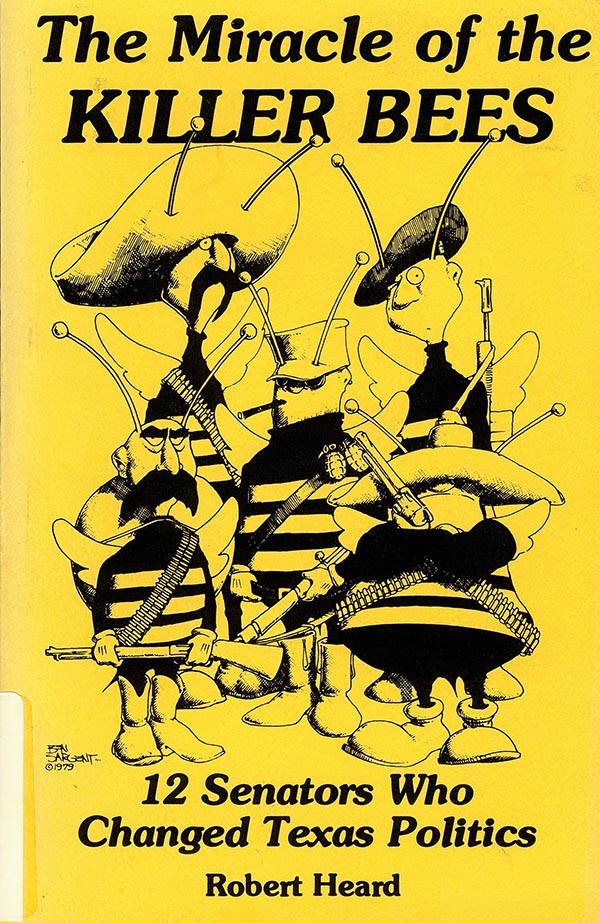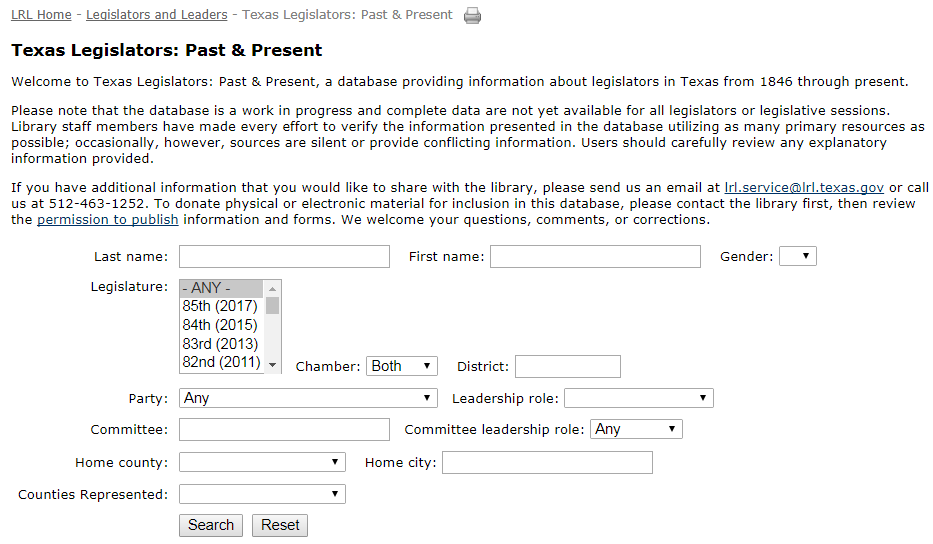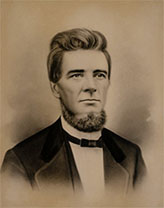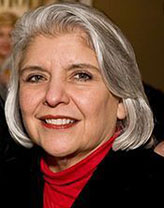- Search Texas Legislators: Past & Present to find information about legislators in Texas (1846–present);
- Explore biographical information and gubernatorial documents (1846–present) in our Governors of Texas database;
- Access biographical information on Speakers and Lt. Governors of Texas (1846–present), search documents authored by them, and more;
- Browse a list of Senate Presidents Pro Tempore (1846–present);
- View Senate and House seniority data for selected years;
- Examine demographic member statistics about Texas legislators back to the 74th Legislature;
- Find contact information, district information, and party affiliation for elected officials in Texas; and
- See a list of current Texas legislators on Twitter.
Seeking information about Texas’ elected leadership? The Legislators and Leaders section of our website compiles myriad resources to aid your research. You can…
Every few years, we update our comparison across Legislatures of the percent of freshmen at the beginning of each regular session. Here's our first post from 2012 on the topic (which explains some of the reasons for unusually high numbers), and here is the 2014 update.
Below you can see the graph with the addition of the 84th and 85th Legislatures. Please note that we defined freshmen as new legislators sworn in during the first day or week of the regular session. Members who first served during a called session of a legislature are counted as freshmen members of that legislature. Excluded are members who were elected to a legislature but never sworn in due to death, resignation, or other factors.
You can see these and other figures on our member statistics page. Exact percentage of freshmen each session can be found here.
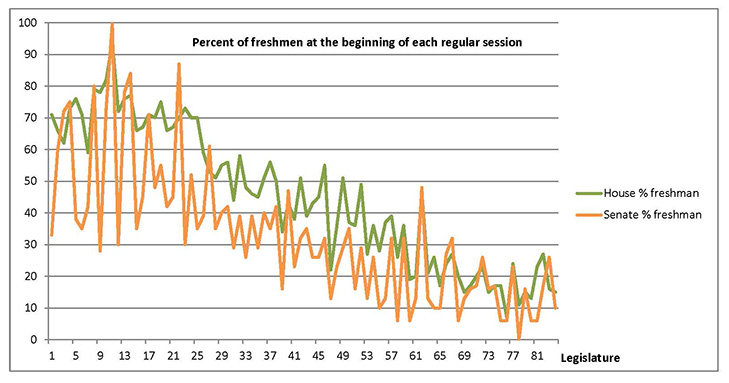
Members Reunion Day, 2017
Apr 26
The large tent that appears on the south lawn of the Capitol near the end of every session is as reliable a marker of Spring as the arrival of the bluebonnets. The white canopy serves as the customary venue for the Members Reunion Day luncheon, part of a perennial celebration of House service that takes place this week on April 28.
All current and former House members are invited to the event, which begins with breakfast in the Capitol and concludes with barbecue under the big top. In between, current members will take a pause from their legislative duties to pay tribute to previous members and Speakers.
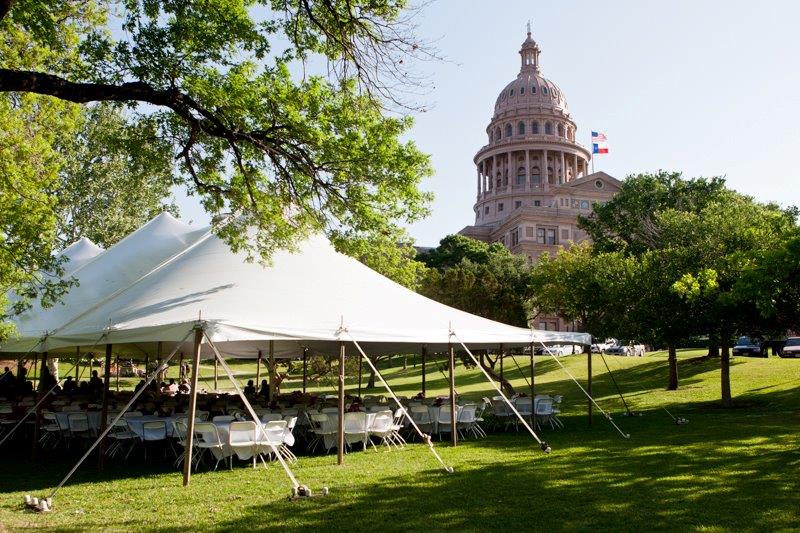
Setting aside time to honor the leadership is a long-standing tradition in the House of Representatives. With a few exceptions, Speaker's Day—as it was originally known—has been held every session since 1876.
For much of its history, Speaker’s Day was a congratulatory observance with a solitary focus. Common features of the early days included poetry, public tributes, and other forms of high praise. The popular “presentation of gifts” consisted of traditional keepsakes, such as watches, Bibles, cuff-buttons, and tea services.
In later years, popular music and good-natured satire accompanied the lofty language used in earlier celebrations. By the 1940s, lauding the Speaker with polished prose was out of fashion, and more colorful forms of expression made their way into the mix.
In 1943, for example, Representative Will Smith enchanted House members with his own clever couplet:
If I've grown old and there's silver in my hair.
Speaker Price Daniel put it there.
A choral club from Dallas regaled Speaker William Otey Reed in 1947 with a tender rendition of "Smoke Gets in Your Eyes."
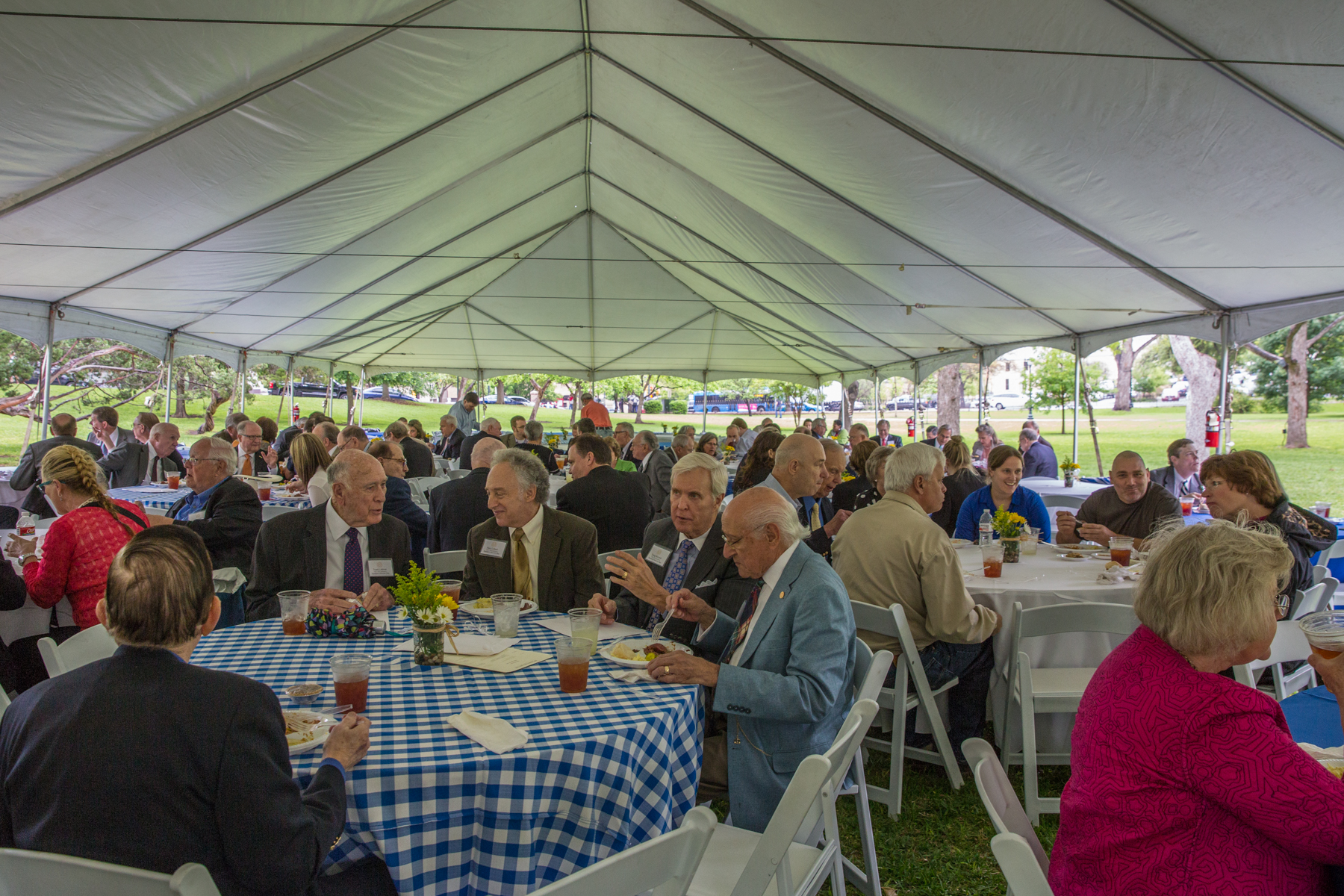
Although the focus and name of the day have changed, Members Reunion Day perpetuates the same celebratory spirit and sense of common purpose as the earliest commemorations. A similar motivation is reflected in the Senate, which has its own tradition dating back to 2003.
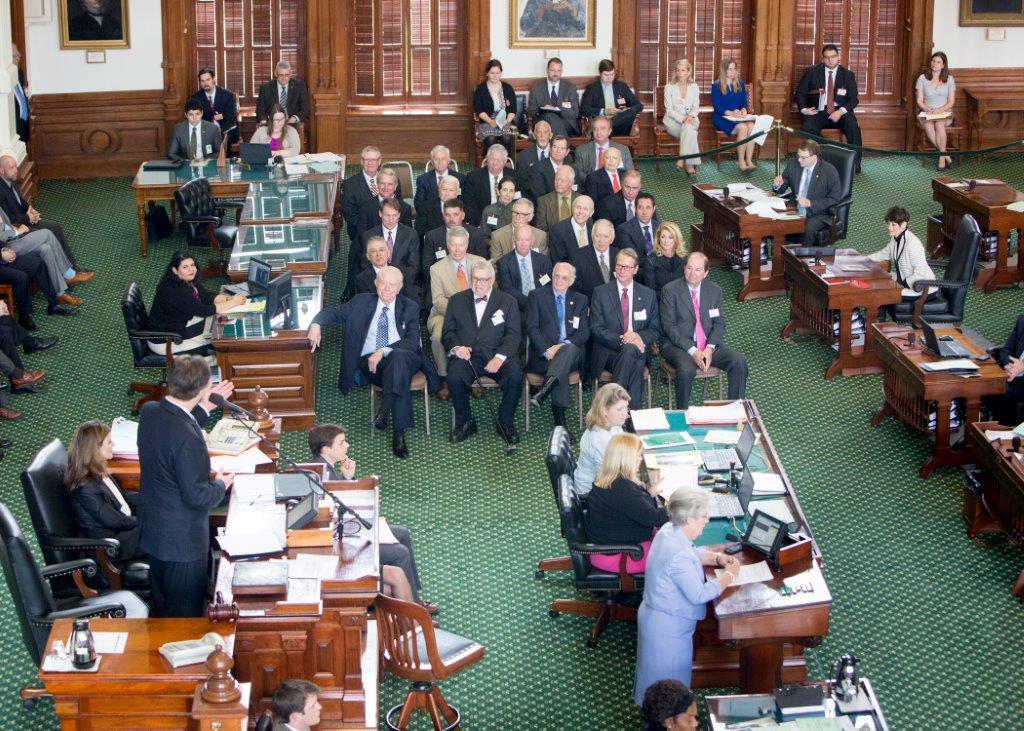
This week the Senate will also take a break from the rigors of the legislative session to celebrate the service of former senators. Former Members Day, as it is called in the Senate, begins with a dinner on Wednesday, April 26. A ceremony honoring living and deceased former members will take place in the Senate chamber following breakfast on Thursday. Senators who served in the military will receive special recognition this session.
During the ceremony, former senators will be seated within the rail of the Senate, and the names of senators who have died since the last official gathering will be read. As a lasting tribute, copies of the Senate's biennial publication, A State of Remembrance, will be distributed to members.
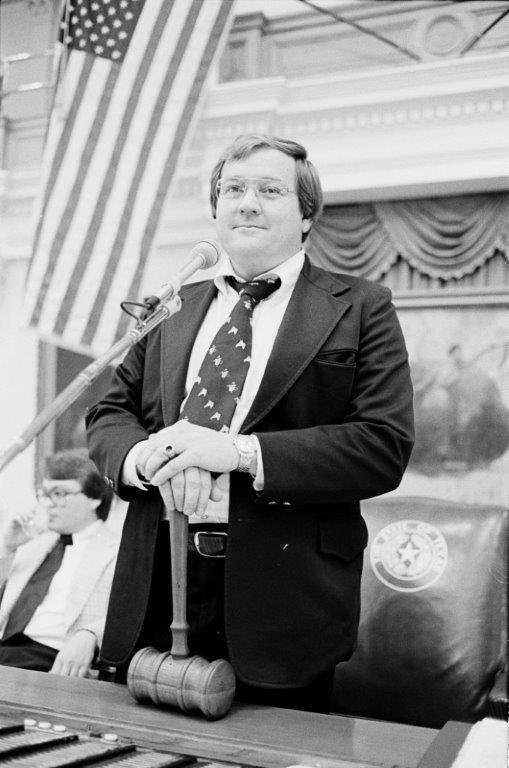
This is the third installment in our occasional series, "Texas Treasures," highlighting some of the men and women who have served in the Texas Legislature. In previous posts, we featured Rep. Frank Calhoun and Sen. A.R. "Babe" Schwartz.
A lot of strong words have been used to describe former Rep. Bob Davis—intense, shrewd, wily, riveting. And with good reason. Words applied to lawmakers with ordinary resolve and conventional political skills are too meager for a man Texas Monthly once called: "beyond moderation . . . beyond classification . . . a player so avid he raises political gamesmanship to the intensity of a force of nature."1
Robert Eugene "Bob" Davis represented Dallas County in the House of Representatives from 1973-1983. During his tenure he served on the body's most powerful committees including: Calendars; Ways and Means, which he presided over for two sessions; and Regions, Compacts, and Districts, currently known as Redistricting. Davis was also a member of the House Insurance committee for three sessions, serving as chairman during the 65th Legislature.
Following his freshman session, Davis was a delegate to the Texas Constitutional Convention and a member of the Citizens' Conference on State Legislatures, a precursor to the National Conference of State Legislatures.
The power of Davis' political resolve was untested when he entered the race for a House seat in 1972. He was young, inexperienced, and virtually unknown to the voters of his district when he signed on as a last-minute recruit in a landmark election season.
"I was 30 years old at the time of filing. My wife was pregnant with our third child, and it wasn't a good time," Davis explained. "A lawyer I knew called me in June and told me the Republican candidate had to drop out. He said: 'We have called 39 people, and no one wants to run. Are you interested?' I said yes and became a replacement candidate."2
It didn't take long for Davis to prove himself a worthy replacement. His affinity for hard work and his status as a Republican worked to his advantage during the campaign—as did his lack of political experience. "I never really thought I would lose," Davis told the Irving Daily News after his stunning victory.3
The political odds were definitely in Davis' favor that year. Outrage over the Sharpstown Stock Fraud Scandal set the stage for a watershed election in 1972. And a court-ordered redistricting plan that required Dallas County to shift to single-member districts had provided a promising opening for a Republican candidate.4
Once committed, Davis seized the opportunity. In the notorious "year they threw the rascals out," he trounced a well-known incumbent and joined a corps of reform-minded freshmen who were sent to Austin to shake things up.
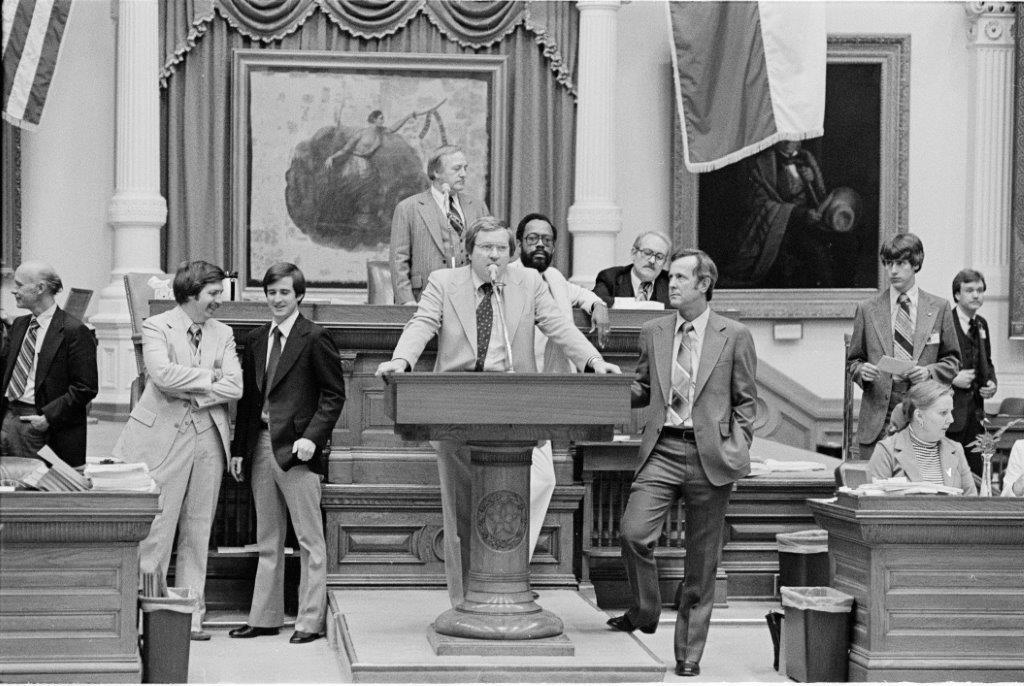
When the 63rd Legislature convened in 1973, almost half of the House members were first-time lawmakers, and "none were greener than I," Davis remarked.5
After taking office, Davis' knack for the political craft made it clear he was uniquely qualified to shake things up. Green or not, he was definitely a player.
Davis was featured in Texas Monthly's biennial assessment of best and worst lawmakers three times during his legislative career. Reflecting on his well-known status as a political heavyweight, Davis recalled two skills that were emphasized during freshman orientation: knowledge of the rules and personal relationships.
"My ideas were set when I first arrived. The exercise of power is really just an appreciation of knowledge—like the rules and the process—and personalities. There is nothing magical about it . . . I always had an affinity for the Rules of Procedure. My mastery of them helped me become a formidable opponent . . . It was also important to learn what was going on in the basement. I thought what we were doing was important, so I played hard, and I played to win."6
Davis authored over 150 pieces of legislation during his 10-year career, many of which dealt with complex aspects of insurance and tax law. Of particular significance were bills passed in 1977 and 1979 related to taxation of intangible property and valuation of agricultural land.7
At issue, particularly in cities like Irving which Davis represented, was whether large tracts of undeveloped land should be taxed based on productivity rather than fair market value. Davis argued in favor of switching to an "ag-use" valuation that would reduce the tax burden on farmers who were in danger of being forced to sell their land.
Opponents of the legislation were concerned the ultimate beneficiaries would be real estate developers and that cities would make up for lost revenue by raising taxes on homeowners. Acknowledging his bill drew no distinction between corporate and individual landowners, Davis made the case that promoting agricultural production was a worthy goal regardless of ownership.8 Davis and others successfully addressed homeowners' concerns in a constitutional amendment authored by Tim Von Dohlen. Considered together, the legislation provided a balanced solution to an acute problem and included tax relief for homeowners as well as farmers.
Altering tax policy is among the most contentious tasks a lawmaker can take on, and not every member is up to the challenge. In this case, Davis and his colleagues negotiated a tradeoff between urban and rural interests that saved cities from a huge tax increase and allowed agricultural land to remain in production.9
As a result of his efforts, Davis was named one of Texas Monthly's "ten best" and one of Texas Business magazine's "five best" legislators in 1979. It also burnished his credentials as a "peerless strategist" and a "genius" at the legislative process.10
Davis' expertise in addressing complex issues earned him several positions in state government after leaving the legislature in 1983. Three years after returning to his private law practice, Davis became director of budget and planning for Gov. Bill Clements, an experience he said was "fun and difficult."11 He also served on Governor Clements' taxation committee and was a member of the General Services Commission from 1989 to 1995.12
Davis practiced law for several years after completing his service in state government. Eventually, he eased out of litigation and focused on wills, estates, and regulatory matters. Davis is now enjoying what he calls "a comfortable period of doing a whole lotta nuthin'." 13
Looking back on his legislative service, Davis recalls: "The Legislature was a fascinating place for me . . . I didn't want to give up doing the job of a member, but I absolutely became tired of the process of getting elected." 14
Davis says he is not political now. He leaves that work to his son, Doug, and his daughter-in-law, Karina.
When we spoke in October, Davis and his wife were preparing for a trip to the Pacific Northwest. "We will be enjoying ourselves and following the trail of Lewis and Clark"15—a fitting journey of discovery for a "force of nature."
A collection of Representative Davis' legislative memorabilia is on display in the Legislative Reference Library.
1 Burka, Paul. "The Ten Best and the Ten Worst Legislators," Texas Monthly, July 1981, p. 108.
2 Davis, Bob, interview by Nancy Watson and Lindsay Wickham, 10/14/2016.
3 Wilson, Doris E. "Bob Davis: New State Rep Champing at the Bit to Start," Irving Daily News, 11/26/1972, p. 1.
4 Deaton, Charles. The Year They Threw the Rascals Out, Austin, TX: Shoal Creek Publishers, 1973, p. 151, 153.
5 Davis, Bob, 10/14/2016.
6 Ibid.
7 Legislative Reference Library, Legislative Archive System, accessed 1/16/2017.
8 McDaniel, Ann. "The 'Ag-Use' Tax: Does it Spell Relief?" Dallas Times-Herald, 5/6/1979.
9 Davis, Bob, 10/14/2016.
10 Burka, Paul, "The Ten Best and the Ten Worst Legislators," Texas Monthly, July 1979, p. 95.
11 Davis, Bob, 10/14/2016.
12 Legislative Reference Library, Texas Appointment System, accessed 1/17/2017.
13 Davis, Bob, 10/14/2016.
14 Ibid.
15 Ibid.
Below you'll find a preview of the 85th Texas Legislature. New and returning members will be sworn in on January 10, 2017, the opening day of the regular session.
Membership statistics for previous sessions are available on the library's Member statistics page.
Summary of the 85th Legislature
| Party | House | Senate | Overall |
|---|---|---|---|
| Democrat | 55 | 11 | 66 |
| Republican | 95 | 20 | 115 |
| Total | 150 | 31 | 181 |
| Gender | House | Senate | Overall |
|---|---|---|---|
| Women | 29 | 8 | 37 |
| Men | 121 | 23 | 144 |
| Total | 150 | 31 | 181 |
Members not returning to the 85th Texas Legislature
| Not Returning | Replacement | ||
|---|---|---|---|
 |
Sen. Rodney Ellis (D) |  |
Borris Miles (D) |
 |
Sen. Kevin Eltife (R) |  |
Bryan Hughes (R) |
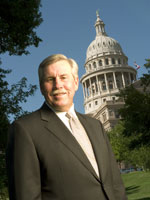 |
Sen. Troy Fraser (R) |  |
Dawn Buckingham (R) |
 |
Rep. Jimmie Don Aycock (R) |  |
Scott Cosper (R) |
 |
Rep. Myra Crownover (R) |  |
Lynn Stucky (R) |
 |
Rep. Marsha Farney (R) |  |
Terry Wilson (R) |
 |
Rep. Allen Fletcher (R) |  |
Tom Oliverson (R) |
 |
Rep. Rick Galindo (R) |  |
Philip Cortez (D) |
 |
Rep. Patricia Harless (R) |  |
Kevin Roberts (R) |
 |
Rep. Bryan Hughes (R) |  |
Cole Hefner (R) |
 |
Rep. Jim Keffer (R) |  |
Mike Lang (R) |
 |
Rep. Susan King (R) |  |
Stan Lambert (R) |
 |
Rep. John Lujan (R) |  |
Tomas Uresti (D) |
 |
Rep. Marisa Márquez (D) |  |
Evelina Ortega (D) |
 |
Rep. Trey Martinez Fischer (D) |  |
Diana Arevalo (D) |
 |
Rep. Borris Miles (D) |  |
Shawn Thierry (D) |
 |
Rep. Doug Miller (R) |  |
Kyle Biedermann (R) |
 |
Rep. Elliott Naishtat (D) |  |
Gina Hinojosa (D) |
 |
Rep. John Otto (R) |  |
Ernest Bailes (R) |
 |
Rep. Gilbert Peña (R) |  |
Mary Ann Perez (D) |
 |
Rep. Debbie Riddle (R) |  |
Valoree Swanson (R) |
 |
Rep. Kenneth Sheets (R) |  |
Victoria Neave (D) |
 |
Rep. David Simpson (R) |  |
Jay Dean (R) |
 |
Rep. Wayne Smith (R) |  |
Briscoe Cain (R) |
 |
Rep. Stuart Spitzer (R) |  |
Lance Gooden (R) |
 |
Rep. Laura Thompson (I) |  |
Barbara Gervin-Hawkins (D) |
 |
Rep. Scott Turner (R) |  |
Justin Holland (R) |
 |
Rep. Sylvester Turner (D) |  |
Jarvis Johnson (D) |
 |
Rep. Molly White (R) |  |
Hugh Shine (R) |
This is the second installment in our new series, "Texas Treasures," highlighting some of the men and women who have served in the Texas Legislature. In our first post, we featured Sen. A.R. "Babe" Schwartz.
Frank Calhoun comically attributes much of his success in life to the fact that he "keeps showing up."
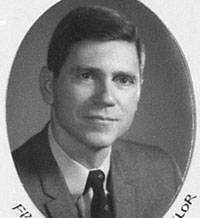 Rep. Frank Calhoun, 61st Legislature (1969).
Rep. Frank Calhoun, 61st Legislature (1969).And show up he has. Frank represented Taylor County in the House of Representatives from 1967-1975, and he has been a reliable presence in the Capitol ever since. Frank announced his retirement early this year after being active in Texas politics for over 50 years.
Frank was a law student at the University of Texas when he landed his first job in the Capitol in 1957. As an Assistant Sergeant-at-Arms, he was responsible for distributing messages to House offices and performing other clerical tasks. But mostly he sat on a stool in a dark elevator with a law book in hand, an experience he shares with other former lawmakers.
"It was simple. People would get on the elevator, and I would punch the button." It wasn't glamorous, but being able to study while he worked was a great benefit. "It never occurred to me that one day I might be elected to the Legislature. I just wanted to get through school and become a lawyer."
After Frank passed the bar exam he went home to Abilene and became a lawyer. His interest and involvement in his community naturally extended to Democratic politics.
In 1966, when redistricting created an opportunity for someone from Abilene to be elected to the House of Representatives, Frank was recruited. "Four men called me to a meeting over a bottle of single malt and told me I was going to run. They agreed to take care of raising all the money. All I had to do was get elected."
During the last of Frank's four terms in the House, he was selected as a delegate to the State Constitutional Convention, which attempted to redraft a new constitution for Texas. The Constitution, he explained, "should reflect the contract between the people and their government." Instead it was a "statutory tangle." Regrettably, the Con-Con's revision failed by three votes. "That was the culmination of my legislative service and one of the most significant experiences."
Frank's involvement in politics continued after he left the Legislature and joined the Houston law firm of Liddell, Sapp, Zivley, Hill & LaBoon where he specialized in legislative and administrative matters.
Frank remembers his time in the Legislature as a very satisfying and interesting experience. Serious moments were frequently interspersed with humor and fun. "I got to know people from all over the state . . . Relationships develop. Periods of great stress forge friendships that never fade."
Several of the friendships Frank forged during those years are celebrated annually at Hilary Doran's ranch near Del Rio. Hilary extended the first invitation in 1967, and his friends have been showing up every November since. Frank expects this year's meeting of "The Extinguished" to be the last in a treasured tradition.
Frank has only missed one Doran Ranch meeting in 48 years. Most members of the group have been former legislators or legislative staff, several of whom have died in recent years.
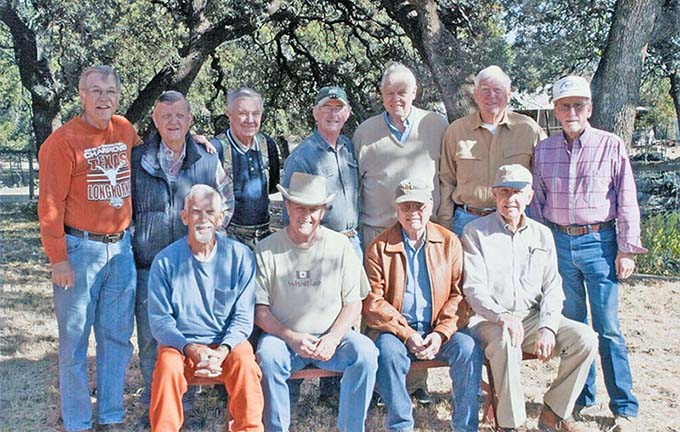 Back row, left to right: Rayford Price, L.E. "Lee" Arnold, Dick Callahan, Walter Fisher, Glenn Biggs, Frank Calhoun, Guy Floyd
Back row, left to right: Rayford Price, L.E. "Lee" Arnold, Dick Callahan, Walter Fisher, Glenn Biggs, Frank Calhoun, Guy FloydFront row, left to right: Charlie Schnabel, Hilary Doran, Neil Caldwell, Bill Finck
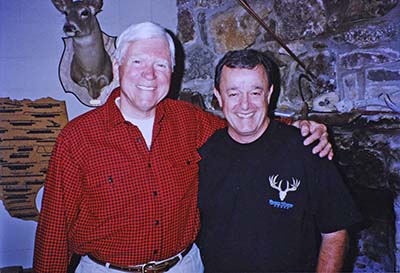 Frank Calhoun and Hilary Doran at Doran Ranch, November 2005.
Frank Calhoun and Hilary Doran at Doran Ranch, November 2005.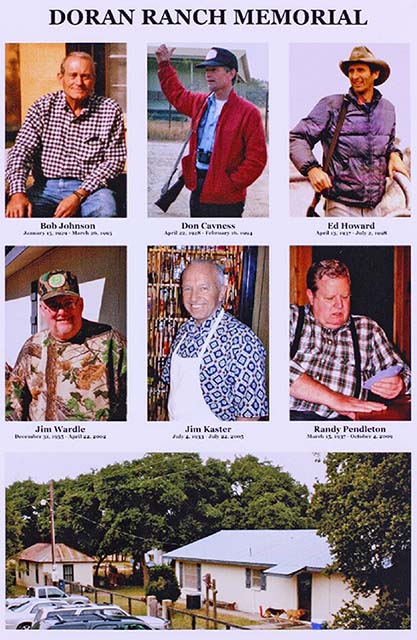 Deceased members include: Bob Johnson, Don Cavness, Ed Howard, Jim Wardle, Jim Kaster, and Randy Pendleton. Not pictured are: Glenn Biggs, Dick Cory, David Crews, and Grant Jones. Bottom photo: The lodge at Doran Ranch.
Deceased members include: Bob Johnson, Don Cavness, Ed Howard, Jim Wardle, Jim Kaster, and Randy Pendleton. Not pictured are: Glenn Biggs, Dick Cory, David Crews, and Grant Jones. Bottom photo: The lodge at Doran Ranch.
A newly revised and expanded list of Senate Presidents Pro Tempore is now available on the library website. The page provides a list of legislators who have held this position, as well as a narrative history highlighting the changing nature of the position through the years.
As outlined in the Texas Constitution, the Senate President Pro Tem performs the duties of the Lieutenant Governor in his or her absence. Senate tradition also calls for the President Pro Tempore to be sworn in as "Governor for a Day", a 60+-year tradition that includes ceremonies and celebrations honoring the President Pro Tem and showcasing his or her district.
During the 84th Texas Legislature in 2015, Sen. Juan "Chuy" Hinojosa served as Senate President Pro Tem for the Regular Session, and Sen. Kevin Eltife was elected at the close of the Regular Session for the legislative interim.
Did you know?
Before 1876, there was no constitutional requirement for electing a Senate President Pro Tem at the beginning and close of each session. Instead, Art. V, Sec. 13 of the 1845 Texas Constitution provided that:
"Whenever the If the lieutenant governor shall...die, resign, or be absent from the State during the recess of the legislature, it shall be the duty of the secretary of State to convene the Senate for the purpose of choosing a president for the time being."
This is the first installment in our new series, "Texas Treasures," highlighting some of the men and women who have served in the Texas Legislature.
Sen. Babe Schwartz can still pack a punch. On July 17, the former senator will celebrate his 90th birthday, and he shows no signs of throwing in the towel. Born on Galveston Island in 1926, Schwartz represented his home county in the Texas House of Representatives from 1955-1959, and in the Texas Senate from 1960-1981. He remains active in the Texas legislative community today as a lobbyist.
Known for his "stinging, colorful oratory," Senator Schwartz landed more than a few verbal punches during his service in the Legislature. In fact, he gained such a reputation for enjoying a good fight that at one point, Lt. Governor Hobby gave Schwartz a pair of boxing gloves (shown below) after one of his debates with another member. The gloves are now a prized part of the senator's interesting collection of memorabilia.
Senator Schwartz has always been a bit of a brawler, especially when it comes to causes and people he cares about. Fortunately for the citizens of Texas, protecting our coastal resources is one of the things he cares most about. One of the senator's most significant legislative accomplishments was passage of the Coastal Public Lands Management Act of 1973, which made Texas a leader in coastal preservation.
After a career of advocating for Texas beaches and ensuring public access to them, it is fitting that the city of Galveston would recognize Senator Schwartz' legacy by naming a new beach in his honor. Babes's Beach, formerly a forgotten stretch of submerged shoreline located west of 61st street, is now fully restored and is "about as pretty as it gets," according to John Schwartz, the senator's son. "And yes, you can expect a bunch of tourists to come there looking for the babes. That's probably part of the idea."
Senator Schwartz and his wife Marilyn, a champion of Texas beaches in her own right, were joined at the beach dedication ceremony on May 25th, by a large group of family and friends. Standing on the strand accepting the honor, Schwartz spoke of his love for the island. "I won the lottery being born in Galveston."
And Galveston, one could argue, hit the jackpot when the citizens chose Babe Schwartz to represent them in the Legislature. Without Babe in their corner, the island -- and the entire Texas coast -- would not be what it is today.
Thank you and Happy Birthday, Senator Schwartz! We think you are the greatest!
(Pictured below: Senator Schwartz and his wife Marilyn attended the beach dedication ceremony with their family. Photo courtesy of Senator Schwartz. On the right, Sen. Schwartz wears his boxing glove given to him by Lt. Governor Hobby.)


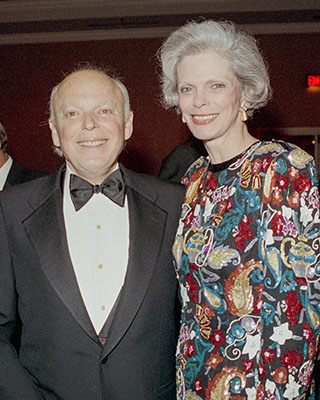
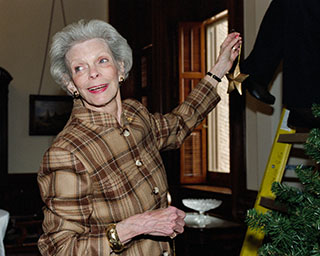
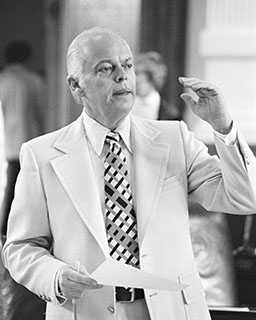
(Photos of Senator and Mrs. Schwartz courtesy of the Texas Senate.)
In January, we compiled a list of members not returning to the 85th Texas Legislature. An updated list that includes the results of the recent primary runoffs is provided below. 22 members of the Texas House and 2 members of the Texas Senate will not return in 2017. To see a full list of members of the 84th Texas Legislature (2015), please go here.
Table: Members not returning to the 85th Texas Legislature
 |
Rep. Jimmie Don Aycock | Retiring |
 |
Rep. Myra Crownover | Retiring |
 |
Sen. Kevin Eltife | Retiring |
 |
Rep. Joe Farias | Resigned effective 8/10/15 |
 |
Rep. Marsha Farney | Defeated in Republican primary election, 3/1/2016 |
 |
Rep. Allen Fletcher | Retiring |
 |
Sen. Troy Fraser | Retiring |
 |
Rep. Patricia Harless | Retiring |
 |
Rep. Bryan Hughes | Won primary runoff for Texas Senate, 5/24/2016 |
 |
Rep. Jim Keffer | Retiring |
 |
Rep. Susan King | Defeated in Republican primary runoff for Texas Senate, 5/24/2016 |
 |
Rep. Marisa Márquez | Retiring |
 |
Rep. Trey Martinez Fischer | Defeated in Democratic primary for Texas Senate, 3/1/2016 |
 |
Rep. Ruth Jones McClendon | Resigned effective 1/31/16 |
 |
Rep. Doug Miller | Defeated in Republican primary runoff, 5/24/2016 |
 |
Rep. Elliott Naishtat | Retiring |
 |
Rep. John Otto | Retiring |
 |
Rep. Debbie Riddle | Defeated in Republican primary election, 3/1/2016 |
 |
Rep. David Simpson | Defeated in Republican primary runoff for Texas Senate, 5/24/2016 |
 |
Rep. Wayne Smith | Defeated in Republican primary runoff, 5/24/2016 |
 |
Rep. Stuart Spitzer | Defeated in Republican primary election, 3/1/2016 |
 |
Rep. Scott Turner | Retiring |
 |
Rep. Sylvester Turner | Resigned effective 1/1/16; sworn in as Mayor of Houston on 1/2/16 |
 |
Rep. Molly White | Defeated in Republican primary election, 3/1/2016 |
The Texas "Killer Bees"
May 26
37 years ago, during the 66th Regular Session, a group of 12 state senators nicknamed the "Killer Bees" organized in the Texas Legislature. From May 18 - May 22, 1979, the Killer Bees hid offsite to prevent the 31-member Senate from reaching a quorum on two bills: S.B. 602, which proposed an early date for a Texas presidential primary, and S.B. 1149, which related to filing fees for primary elections. S.B. 1149 was broad enough that it could be amended to include the provisions of S.B. 602.
According to the The Miracle of the Killer Bees (below), the group got its name from Lt. Governor Hobby, who told a reporter he called them that because "you never know where they're going to hit next." The Killer Bees were Senators Carl Parker, Carlos Truan, Chet Brooks, Ron Clower, Lloyd Doggett, Gene Jones, Glenn Kothmann, Raul Longoria, Oscar Mauzy, W.N. 'Bill' Patman, A. R. 'Babe' Schwartz, and Bob Vale.
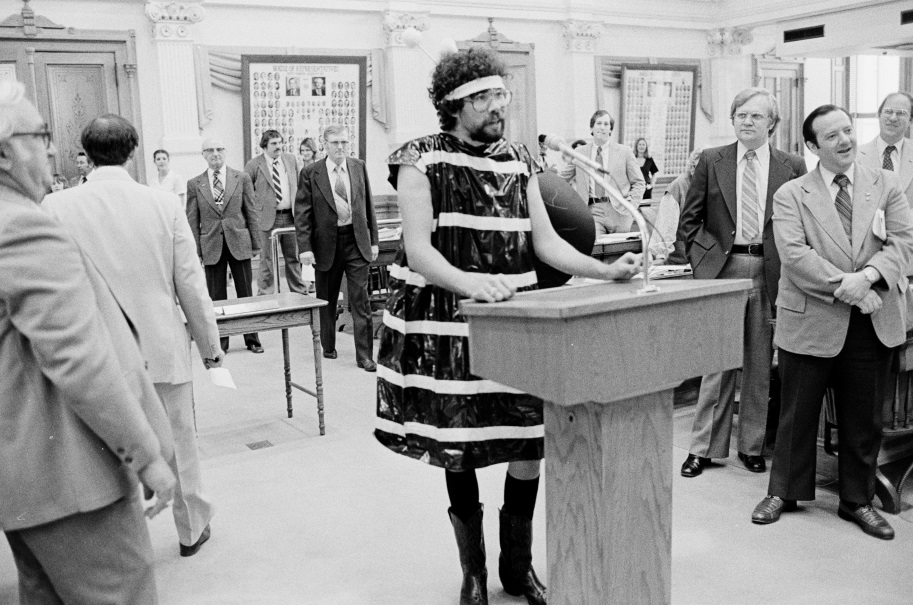
The Texas House receives a message from a Senate "Bee Man." Image courtesy of the Texas State Library and Archives Commission
